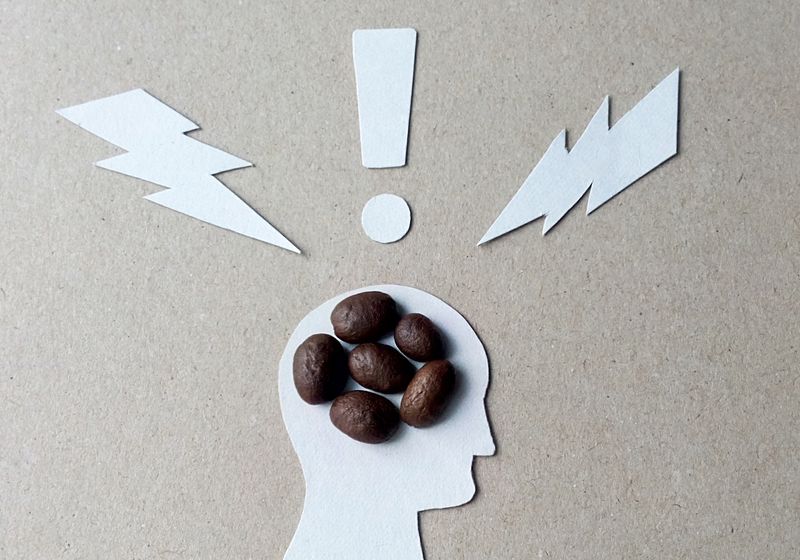Caffeine wakes people up by acting on neurons across the brain.
For many people, morning is impossible to navigate without at least one cup of coffee. Amidst its many compounds that give this brew its unique taste, coffee contains caffeine, which helps push away the morning grogginess and perk a person up.
Many articles attribute caffeine’s effects to its ability to block adenosine from its receptors in the brain. Since adenosine promotes sleep, inhibiting it prevents people from feeling tired. But this is not the whole story.
“There’s not a single mechanism for caffeine to wake us up or for keeping us awake,” said Giancarlo Vanini, a neuroscientist at the University of Michigan. Instead, he said that caffeine acts in several ways across the brain to fend off fatigue. Additionally, Vanini’s team found that this tiny molecule may also decrease pain associated with poor sleep.
Caffeine Turns Off Sleep Neurons Across the Brain
Giancarlo Vanini and his team study brain circuits that regulate sleep, wakefulness, and pain. As part of this work, they study the role of adenosine in these pathways and use caffeine as an intervention.
Giancarlo Vanini
Normally, adenosine builds up in the brain and binds adenosine receptors (ARs) on neurons.1 In a region of the brain responsible for processing reward and motivations, adenosine binds to ARs on inhibitory neurons; this activates these neurons, which in turn shut off neurons in the hypothalamus that promote wakefulness. Alternatively, adenosine can directly activate sleep-promoting neurons in the hypothalamus.2 Lastly, adenosine decreases the release of acetylcholine in the prefrontal cortex, which leads a person to feel less awake.3
Vanini explained that caffeine possesses a similar structure to adenosine and, as a result, it can bind to two ARs and block adenosine from its active site. With caffeine bound to the ARs across these three pathways, the inhibitory neurons are not activated and more acetylcholine is released. 4-6 As a result, a person feels more awake. While Vanini said that there were many other mechanisms that caffeine is suspected to work through, these three pathways are probably the most well-studied.
Vanini added that a person’s susceptibility to caffeine will depend on their genetics. Indeed, previous studies showed that some individuals who rated themselves as insensitive to caffeine had a distinct alteration in a gene for one AR.7 Vanini added that these effects will also be influenced by the amount and frequency with which a person consumes caffeine.
Caffeine Intercepts Pain Signals Mediated by Adenosine
Vanini and his team recently wondered if caffeine could also influence a different sleep-related effect. They had seen that sleep-deprived animals responded worse to a subsequent injury compared to well-rested animals, so they thought about the way that many people respond after a poor night’s sleep: with a cup of coffee. “What if we could treat the side effect—A.K.A. the increasing pain caused by sleep deprivation—in the same way, by using caffeine?”
In a study with rats, they showed that caffeine prevented the increased pain response and decreased its duration in sleep-deprived animals.8 Thinking back to the mechanisms of caffeine in the brain, Vanini and his team focused on the hypothalamus because, in addition to housing sleep machinery, it contains neurons involved in regulating pain. Using a more selective adenosine antagonist that bound a specific AR, they showed that adenosine signaling increased the pain responses following disrupted sleep and that caffeine impeded this pathway as well.8
Although they did not see an effect of caffeine on post-surgical pain in a small clinical trial, Vanini said that they did see a reduction in post-operative delirium.9,10 Considering the relevance of dose and other factors, Vanini is hoping to repeat the study to determine if caffeine, and by extent adenosine, also regulates pain in humans.
- Holst SC, Landolt HP. Sleep homeostasis, metabolism, and adenosine. Curr Sleep Med Rep. 2015;1(1):27-37.
- Brown RE, et al. Control of sleep and wakefulness. Physiol Rev. 2012;92(3):1087-1187.
- Van Dort CJ, et al. Adenosine A1 and A2A receptors in mouse prefrontal cortex modulate acetylcholine release and behavioral arousal. J Neurosci. 2009;29(3):871-881.
- Huang ZL, et al. Adenosine A2A, but not A1, receptors mediate the arousal effect of caffeine. Nat Neurosci. 2005;8(7):858-859.
- Lazarus M, et al. Arousal effect of caffeine depends on adenosine A2A receptors in the shell of the nucleus accumbens. J Neurosci. 2011;31(27):10067-10075.
- John J, et al. Caffeine promotes glutamate and histamine release in the posterior hypothalamus. Am J Physiol Regul Integr Comp Physiol. 2014;307(6):R704-R710.
- Rétey JV, et al. A genetic variation in the adenosine A2A receptor gene (ADORA2A) contributes to individual sensitivity to caffeine effects on sleep. Clin Pharmacol Therap. 2007;81(5):692-698.
- Hambrecht-Wiedbusch VS, et al. Preemptive caffeine administration blocks the increase in postoperative pain caused by previous sleep loss in the rat: A potential role for preoptic adenosine A2A receptors in sleep–pain interactions. Sleep. 2017;40(9):zsx116.
- Vlisides PE, et al. The effects of intraoperative caffeine on postoperative opioid consumption and related outcomes after laparoscopic surgery: A randomized controlled trial. Anesth Analg. 2021;133(1):233-242.
- Vlisides PE, et al. Caffeine, postoperative delirium and change in outcomes after surgery (CAPACHINOS)-2: Protocol for a randomised controlled trial. BMJ Open. 2023;13(5):e073945

